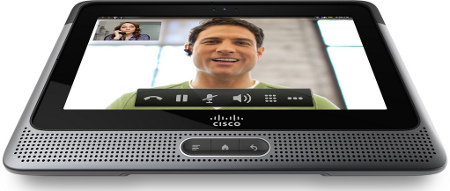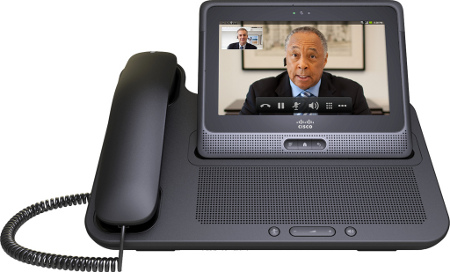Cisco spins enterprise-oriented app stores for Android tablet
Jun 29, 2011 — by LinuxDevices Staff — from the LinuxDevices Archive — 2 viewsCisco Systems has announced an app ecosystem for its Android-based Cius tablet. Marking the company's entry into a crowded landscape, “AppHQ” will focus on IT managers and professionals, according to the company.
The AppHQ app ecosystem is designed for IT pros seeking to create, manage and deploy tablet applications within their enterprise. Cisco is pairing it with the Cius, an Android-based tablet that emphasizes voice, video, collaboration and virtualization capabilities.
The seven-inch Cius (below) is scheduled for a July 31 global release, with an estimated price point below $750. Cisco plans on integrating a number of branded products into the user interface, including Cisco TelePresence, Cisco WebEx meeting applications, Cisco Quad social software and Cisco Jabber messaging.

Cisco Cius
Cisco will allow businesses to host their own private app store within the AppHQ storefront. Those private stores will be customizable down to corporate logos and icons.
In keeping with standards of enterprise security, IT managers will have control over which employees within an organization can download apps, and grant access to those apps based on type, source and category. Every application within the AppHQ storefront will undergo validation testing, Cisco adds.
"Cisco is extending its leadership in networked collaboration to the mobile form factor in a highly secure and controlled way," Barry O'Sullivan, senior vice president of Cisco's Communications and Collaboration Group, wrote in a June 29 statement. "Our customers' positive response to Cius reflects how technology can change not only when and how we work, but also the way IT will deliver collaborative services to employees, and do so in a way that meets the needs of end users and developers and IT managers."
Cisco has a history of plunging into new product categories, only to retreat a short time later. In February, Cisco killed off Cisco Mail, its hosted email service, a mere 13 months after launch. Cisco Mail had faced several established players, including Google Apps and Microsoft's Exchange Online; in the face of that, the service apparently had trouble attracting sufficient customers.
Cisco also shut down its Flip video camera business, which it had purchased for $590 million in 2009. Flip sales tumbled during the 2010 holiday season, calling into question both Cisco's marketing and the ability of a dedicated device like a digital camcorder to survive in a world of do-everything smartphones and tablets.
However, Cisco evidently feels it can make inroads in the crowded tablet market, currently dominated by Apple's iPad. A variety of manufacturers, including Motorola and Samsung, have introduced Android-based tablets over the past few quarters. Meanwhile, Research In Motion is hoping its PlayBook tablet will allow it to make inroads among the same enterprise audience that embraced the BlackBerry.
Background
The Cius features a seven-inch, 1024 x 600 multi-touch display, and runs a version of Android modified with enterprise-focused Cisco software and services. It offers offers 32GB of internal flash memory, front- and rear-facing cameras, GPS, Wi-Fi, Bluetooth, 3G/4G connectivity, and a micro-USB port, according to Cisco.

Cisco Cius in HD media station
Weighing 1.15 pounds and measuring 8.85 by 5.5 by 0.59 inches, the Intel Atom-based Cius can be docked in an optional HD media station. Pictured above, this offers a USB port, a telephone handset, a speakerphone, a gigabit Ethernet port, and a DisplayPort video output.
Further information
More information may be found at Cisco's Cius site.
Nicholas Kolakowski is a writer for eWEEK.
This article was originally published on LinuxDevices.com and has been donated to the open source community by QuinStreet Inc. Please visit LinuxToday.com for up-to-date news and articles about Linux and open source.